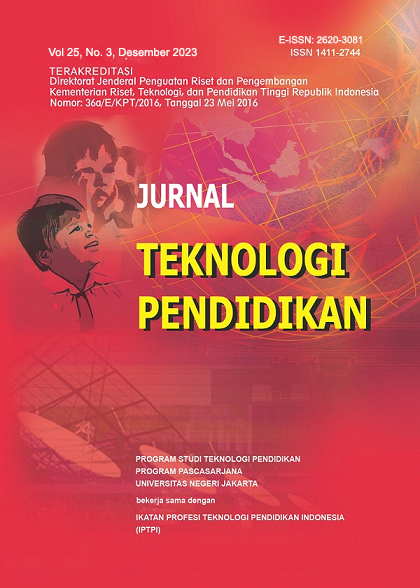The Influence of the Mind Mapping Learning Model Regarding Concept Understanding Learning Outcomes
DOI:
https://doi.org/10.21009/jtp.v25i3.45711Keywords:
Mind Mapping, Understanding Concepts, Learning ModelAbstract
The mind mapping learning model is a learning model that uses a combination of writing, images, symbols and colors at the same time so that it can maximize the function of the right and left brain to make it easier to remember and understand material concepts. This is the key to effective learning. The mind mapping learning model has often been used by previous researchers to test its effectiveness in increasing understanding of concepts in scientific knowledge (IPA). However, in this research, to test the power of the mind mapping learning model on the learning outcomes of understanding concepts in the social sciences group, namely in the Pancasila Education course in the Pancasila Ideology material which explains events and each event has an implied or abstract meaning so it needs to be concreted, the figures involved, the timeline or dynamics of events, with the characteristics of the material, Mind Mapping is needed to create the main ideas of the material to make it easier for students in the learning process. This research is experimental research which aims to test the effect of the mind mapping model on learning outcomes in understanding concepts.
The results of the analysis of calculating the average final ability score of students (posttest) in the experimental group were 79.43. The results of the analysis of the calculation of the average final ability score of students (posttest) in the control group were 71.87. Based on the results of the questionnaire, data was obtained that students liked learning Pancasila Education with Pancasila Ideology material using the Mind Mapping model, because it has been proven to help students understand the concept of Pancasila Ideology material. Students are also motivated to learn Pancasila Education through the phases in the Mind Mapping model and the character of the model through interesting content.
References
Buzan, T. (2010). Mind Map Smart Book. Gramedia Pustaka Utama.
Ho, YR, Chen, BY, Li, CM, & Chai, EGY (2023). The distance between the humanities and medicine: Building a critical thinking mindset by interdisciplinary dialogue through mind mapping. Thinking Skills and Creativity, 50. https://doi.org/10.1016/j.tsc.2023.101420
Jain, S. (2015). The comprehensive Study of how Mind mapping Technique Helps to Understand Concepts and Ideas in Science Teaching. International. Journal of Scientific and Research Publications, 5(12).
Sugiyono. (2017). Quantitative, Qualitative and R & D Research Methods. Bandung: Alfabeta.
Zahro, F., Degeng, INS, & Mudiono, A. (2018). The influence of the student team achievement division (STAD) learning model and mind mapping on the learning outcomes of fourth grade elementary school students. Premiere Educandum: Journal of Basic Education and Learning, 8(2), 196. https://doi.org/10.25273/pe.v8i2.3021
Anon. n.d.-a. “Impact of Mind-Mapping Technique on EFL Learners’ Vocabulary Recall and Retention, Learning Motivation, and Willingness to Communicate - ScienceDirect.” Retrieved June 16, 2024 (https://www.sciencedirect.com/science/article/pii/S2405844023037672).
Anon. n.d.-b. “Understanding Error Patterns in Students’ Solutions to Linear Function Problems to Design Learning Interventions - ScienceDirect.” Retrieved June 16, 2024 (https://www.sciencedirect.com/science/article/pii/S0959475224000227).
Degeng, I. Nyoman S., Henry Praherdhiono, and Made Duananda Kartika Degeng. 2024. “Learning Design Heutagogical Approach in Developing Self-Determined Learning Skills.” Journal of Education Research and Evaluation 8(2).
Ferguson-Walter, Kimberly J., Maxine M. Major, Chelsea K. Johnson, Craig J. Johnson, Dakota D. Scott, Robert S. Gutzwiller, and Temmie Shade. 2023. “Cyber Expert Feedback: Experiences, Expectations, and Opinions about Cyber Deception.” Computers & Security 130:103268. doi: 10.1016/j.cose.2023.103268.
Guerrero, José María. 2023. “Chapter 1 - What Is Mind Mapping.” Pp. 1–29 in Mind Mapping and Artificial Intelligence, edited by J. M. Guerrero. Academic Press.
Pradana, Mochamad Desta, Punaji Setyosari, Saida Ulfa, and Made Duananda Kartika Degeng. 2024. “Correlation of Learning Systems with Student Engagement and Learning Outcomes.” Al-Hayat: Journal of Islamic Education 8(1):364–77.
Su, Fan, and Di Zou. 2024. “A Comparative Review of Technology-Assisted and Non-Technology Concept Mapping-Based Language Learning.” International Journal of Educational Research Open 6:100319. doi: 10.1016/j.ijedro.2024.100319.
Yang, Kai-Han, Hong Chen, Chun-Juan Liu, Fei-Fei Zhang, and Xiao-Lian Jiang. 2022. “Effects of Reflective Learning Based on Visual Mind Mapping in the Fundamentals of Nursing Course: A Quasi-Experimental Study.” Nurse Education Today 119:105566. doi: 10.1016/j.nedt.2022.105566.
Zhong, Jinping, and Yunxiang Zheng. 2023. “‘What It Means to Be a Digital Citizen’: Using Concept Mapping and an Educational Game to Explore Children’s Conceptualization of Digital Citizenship.” Heliyon 9(9):e19291. doi: 10.1016/j.heliyon.2023.e19291.
Downloads
Published
How to Cite
Issue
Section
License
Jurnal Teknologi Pendidikan is an Open Access Journal. The authors who publish the manuscript in Jurnal Teknologi Pendidikan agree to the following terms.
Attribution-ShareAlike 4.0 International (CC BY-SA 4.0)
-
Attribution — You must give appropriate credit, provide a link to the license, and indicate if changes were made. You may do so in any reasonable manner, but not in any way that suggests the licensor endorses you or your use.
-
ShareAlike — If you remix, transform, or build upon the material, you must distribute your contributions under the same license as the original.
- No additional restrictions — You may not apply legal terms or technological measures that legally restrict others from doing anything the license permits.
Notices:
- You do not have to comply with the license for elements of the material in the public domain or where your use is permitted by an applicable exception or limitation.
- No warranties are given. The license may not give you all of the permissions necessary for your intended use. For example, other rights such as publicity, privacy, or moral rights may limit how you use the material.








